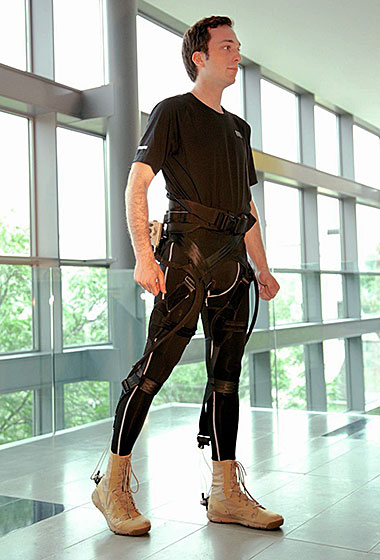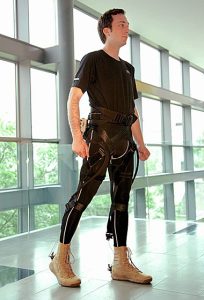
The Wyss Institute for Biologically Inspired Engineering at Harvard University has teamed up with ReWalk Robotics Ltd to fast-track the development of the Institute’s lightweight, wearable soft exosuit technologies for assisting people with lower limb disabilities.

Image credit: Wyss Institute at Harvard University
Conor Walsh, Ph.D. – who is a Core Faculty Member at the Wyss Institute – said the agreement with ReWalk will accelerate the design of assistive exosuits that could help patients suffering from stroke and multiple sclerosis (MS) to regain mobility.
“This is a very exciting day for the soft exosuit technology. ReWalk brings commercialisation expertise and experience in the area of wearable robotics and complements our translation-focused research. Ultimately this agreement paves the way for this technology to make its way to patients,” he said.
The soft exosuit – a first of its kind soft wearable robot – was developed at the Wyss Institute through extensive prototyping that included the involvement of roboticists, mechanical and biomechanical engineers, apparel designers, and software engineers.
Using form-fitting, fabric-based designs that are lightweight and non-restrictive, the Wyss Institute’s soft exosuit uses compact, powerful actuators packaged in a belt to provide assistance to the wearer’s legs in a physiologically relevant manner. These enhanced movements have the potential to assist wearers in walking with greater stability and metabolic efficiency, which could prevent injury and reduce fatigue.
“There is a great need in the health care system for lightweight, lower-cost wearable exoskeleton designs to support stroke patients, individuals diagnosed with multiple sclerosis and senior citizens who require mechanical mobility assistance,” said Larry Jasinski, CEO of ReWalk.
“This collaboration will help create the next generation of exoskeleton systems, making life-changing technology available to millions of consumers across a host of patient populations.”



















